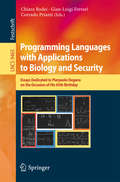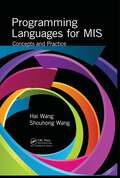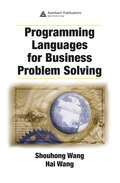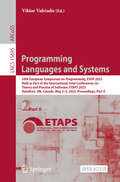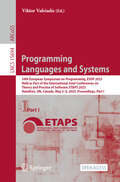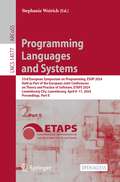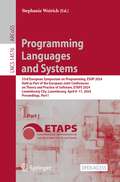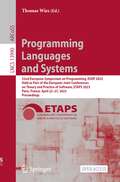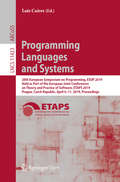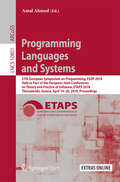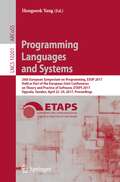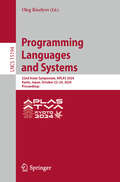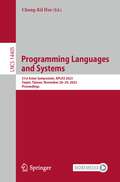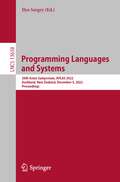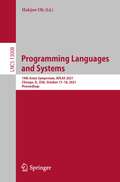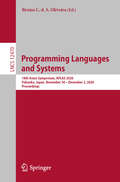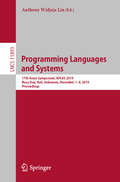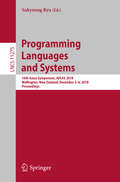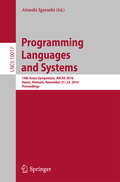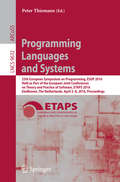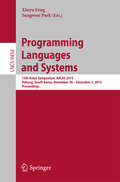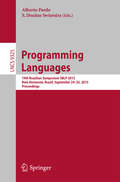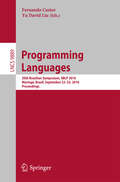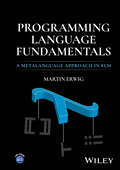- Table View
- List View
Programming Languages with Applications to Biology and Security
by Chiara Bodei Gian-Luigi Ferrari Corrado PriamiThis Festschrift volume is published in honor of Pierpaolo Degano on the occasion of his 65th birthday and is the outcome of a colloquium held in Pisa, Italy, in June 2015. Pierpaolo Degano has worked on a large variety of topics including formal program semantics, concurrency theory, systems biology and security. The volume contains 22 refereed papers and one extended abstract, including personal memoirs and regular research papers by close collaborators and friends and a laudatio illustrating his distinguished career and his main scientific contributions. The papers deal with the main research topics explored by Pierpaolo Degano and those still under his investigation.
Programming Languages for MIS: Concepts and Practice
by Shouhong Wang Hai WangProgramming Languages for MIS: Concepts and Practice supplies a synopsis of the major computer programming languages, including C++, HTML, JavaScript, CSS, VB.NET, C#.NET, ASP.NET, PHP (with MySQL), XML (with XSLT, DTD, and XML Schema), and SQL. Ideal for undergraduate students in IS and IT programs, this textbook and its previous versions have bee
Programming Languages for Business Problem Solving
by Shouhong Wang Hai WangIt has become crucial for managers to be computer literate in today's business environment. It is also important that those entering the field acquire the fundamental theories of information systems, the essential practical skills in computer applications, and the desire for life-long learning in information technology.Programming Languages
Programming Languages and Systems: 34th European Symposium on Programming, ESOP 2025, Held as Part of the International Joint Conferences on Theory and Practice of Software, ETAPS 2025, Hamilton, ON, Canada, May 3–8, 2025, Proceedings, Part II (Lecture Notes in Computer Science #15695)
by Viktor VafeiadisThe open access book set LNCS 15694 + LNCS 15695 constitutes the proceedings of the 34th European Symposium on Programming, ESOP 2025, which was held as part of the International Joint Conferences on Theory and Practice of Software, ETAPS 2025, in Hamilton, Canada, during May 3-8, 2025. The 30 full papers included in the proceedings were carefully reviewed and selected from a total of 88 submissions. The proceedings also contain two short artifact reports. The papers focus on aspects of programming language research such as programming paradigns and styles; methods and tools to specify and reason about programs and languages; programming language foundations; methods and tools for implementation, concurrency and districution; and applications and emerging topics.
Programming Languages and Systems: 34th European Symposium on Programming, ESOP 2025, Held as Part of the International Joint Conferences on Theory and Practice of Software, ETAPS 2025, Hamilton, ON, Canada, May 3–8, 2025, Proceedings, Part I (Lecture Notes in Computer Science #15694)
by Viktor VafeiadisThe open access book set LNCS 15694 + LNCS 15695 constitutes the proceedings of the 34th European Symposium on Programming, ESOP 2025, which was held as part of the International Joint Conferences on Theory and Practice of Software, ETAPS 2025, in Hamilton, Canada, during May 3-8, 2025. The 30 full papers included in the proceedings were carefully reviewed and selected from a total of 88 submissions. The proceedings also contain two short artifact reports. The papers focus on aspects of programming language research such as programming paradigns and styles; methods and tools to specify and reason about programs and languages; programming language foundations; methods and tools for implementation, concurrency and districution; and applications and emerging topics.
Programming Languages and Systems: 33rd European Symposium on Programming, ESOP 2024, Held as Part of the European Joint Conferences on Theory and Practice of Software, ETAPS 2024, Luxembourg City, Luxembourg, April 6–11, 2024, Proceedings, Part II (Lecture Notes in Computer Science #14577)
by Stephanie WeirichThe two-volume open access book set LNCS 14576 + 14577 constitutes the proceedings of the 33rd European Symposium on Programming, ESOP 2024, which was held during April 6-11, 2024, in Luxemburg, as part of the European Joint Conferences on Theory and Practice of Software, ETAPS 2024.The 25 full papers and 1 fresh perspective paper presented in these proceedings were carefully reviewed and selected from 72 submissions. The papers were organized in topical sections as follows:Part I: Effects and modal types; bidirectional typing and session types; dependent types; Part II: Quantum programming and domain-specific languages; verification; program analysis; abstract interpretation.
Programming Languages and Systems: 33rd European Symposium on Programming, ESOP 2024, Held as Part of the European Joint Conferences on Theory and Practice of Software, ETAPS 2024, Luxembourg City, Luxembourg, April 6–11, 2024, Proceedings, Part I (Lecture Notes in Computer Science #14576)
by Stephanie WeirichThe two-volume open access book set LNCS 14576 + 14577 constitutes the proceedings of the 33rd European Symposium on Programming, ESOP 2024, which was held during April 6-11, 2024, in Luxemburg, as part of the European Joint Conferences on Theory and Practice of Software, ETAPS 2024.The 25 full papers and 1 fresh perspective paper presented in these proceedings were carefully reviewed and selected from 72 submissions. The papers were organized in topical sections as follows:Part I: Effects and modal types; bidirectional typing and session types; dependent types; Part II: Quantum programming and domain-specific languages; verification; program analysis; abstract interpretation.
Programming Languages and Systems: 32nd European Symposium on Programming, ESOP 2023, Held as Part of the European Joint Conferences on Theory and Practice of Software, ETAPS 2023, Paris, France, April 22–27, 2023, Proceedings (Lecture Notes in Computer Science #13990)
by Thomas WiesThis open access book constitutes the proceedings of the 32nd European Symposium on Programming, ESOP 2023, which was held during April 22-27, 2023, in Paris, France, as part of the European Joint Conferences on Theory and Practice of Software, ETAPS 2023.The 20 regular papers presented in this volume were carefully reviewed and selected from 55 submissions. They deal with fundamental issues in the specification, design, analysis, and implementation of programming languages and systems.
Programming Languages and Systems: 28th European Symposium on Programming, ESOP 2019, Held as Part of the European Joint Conferences on Theory and Practice of Software, ETAPS 2019, Prague, Czech Republic, April 6–11, 2019, Proceedings (Lecture Notes in Computer Science #11423)
by Luís CairesThis open access book constitutes the proceedings of the 28th European Symposium on Programming, ESOP 2019, which took place in Prague, Czech Republic, in April 2019, held as Part of the European Joint Conferences on Theory and Practice of Software, ETAPS 2019.
Programming Languages and Systems: 27th European Symposium On Programming, Esop 2018, Held As Part Of The European Joint Conferences On Theory And Practice Of Software, Etaps 2018, Thessaloniki, Greece, April 14-20, 2018, Proceedings (Lecture Notes in Computer Science #10801)
by Amal AhmedThis open access book constitutes the proceedings of the 27th European Symposium on Programming, ESOP 2018, which took place in Thessaloniki, Greece in April 2018, held as Part of the European Joint Conferences on Theory and Practice of Software, ETAPS 2018. The 36 papers presented in this volume were carefully reviewed and selected from 114 submissions. The papers are organized in topical sections named: language design; probabilistic programming; types and effects; concurrency; security; program verification; program analysis and automated verification; session types and concurrency; concurrency and distribution; and compiler verification.
Programming Languages and Systems: 26th European Symposium on Programming, ESOP 2017, Held as Part of the European Joint Conferences on Theory and Practice of Software, ETAPS 2017, Uppsala, Sweden, April 22–29, 2017, Proceedings (Lecture Notes in Computer Science #10201)
by Hongseok YangThis book constitutes the proceedings of the 26th European Symposium on Programming, ESOP 2017, which took place in Uppsala, Sweden in April 2017, held as Part of the European Joint Conferences on Theory and Practice of Software, ETAPS 2017.The 36 papers presented in this volume were carefully reviewed and selected from 112 submissions. They cover traditional as well as emerging topics in programming languages. In detail they deal with semantic foundation and type system for probabilistic programming; techniqu3es for verifying concurrent or higher-order programs; programming languages for arrays or web data; program analysis and verification of non-standard program properties; foundation and application of interactive theorem proving; graph rewriting; separation logic; session type; type theory; and implicit computational complexity.
Programming Languages and Systems: 22nd Asian Symposium, APLAS 2024, Kyoto, Japan, October 22-24, 2024, Proceedings (Lecture Notes in Computer Science #15194)
by Oleg KiselyovThis book constitutes the proceedings of the 22nd Asian Symposium on Programming Languages and Systems, APLAS 2024, held in Kyoto, Japan, during October 22-24, 2024. The 18 full papers presented here were carefully reviewed and selected from 37 submissions. These papers have been categorized under the following topical sections: Type theory and Semantic Frameworks; Probabilistic and Declarative Programming; Quantum Computation; Logical Relations; Verification.
Programming Languages and Systems: 21st Asian Symposium, APLAS 2023, Taipei, Taiwan, November 26–29, 2023, Proceedings (Lecture Notes in Computer Science #14405)
by Chung-Kil HurThis book constitutes the refereed proceedings of the 21st Asian Symposium on Programming Languages and Systems, APLAS 2023, held in Taipei, Taiwan, during November 26–29, 2023.The 15 full papers included in this book are carefully reviewed and selected from 32 submissions. They were organized in topical sections as follows: semantics, logics, and foundational theory; design of languages, type systems, and foundational calculi; domain-specific languages; compilers, interpreters, and abstract machines; program derivation, synthesis, and transformation; program analysis, verification, and model-checking; logic, constraint, probabilistic, and quantum programming; software security; concurrency and parallelism; tools and environments for programming and implementation; and applications of SAT/SMT to programming and implementation.
Programming Languages and Systems: 20th Asian Symposium, APLAS 2022, Auckland, New Zealand, December 5, 2022, Proceedings (Lecture Notes in Computer Science #13658)
by Ilya SergeyThis book constitutes the proceedings of the 20th Asian Symposium on Programming Languages and Systems, APLAS 2022, held in Auckland, New Zealand, in December 2022.The 10 papers presented in this volume were carefully reviewed and selected from 22 submissions. They were organized in topical sections as follows: Semantics and Analysis; Testing and Verification; Types.
Programming Languages and Systems: 19th Asian Symposium, APLAS 2021, Chicago, IL, USA, October 17–18, 2021, Proceedings (Lecture Notes in Computer Science #13008)
by Hakjoo OhThis book constitutes the proceedings of the 19th Asian Symposium on Programming Languages and Systems, APLAS 2021, held in Chicago, USA, in October 2021.* The 17 papers presented in this volume were carefully reviewed and selected from 43 submissions. They were organized in topical sections named: analysis and synthesis, compilation and transformation, language, and verification. * The conference was held in a hybrid format due to the COVID-19 pandemic.
Programming Languages and Systems: 18th Asian Symposium, APLAS 2020, Fukuoka, Japan, November 30 – December 2, 2020, Proceedings (Lecture Notes in Computer Science #12470)
by Bruno C. d. S. OliveiraThis book constitutes the proceedings of the 18th Asian Symposium on Programming Languages and Systems, APLAS 2020, held in Fukuoka, Japan, in December 2020.*The 19 papers presented in this volume were carefully reviewed and selected from 46 submissions. They were organized in topical sections named: Invited Papers, Types, Program Analysis, Semantics, Language Design and Implementation, Concurrency, Verification, and Logic and Automata. * The conference was held virtually due to the COVID-19 pandemic.
Programming Languages and Systems: 17th Asian Symposium, APLAS 2019, Nusa Dua, Bali, Indonesia, December 1–4, 2019, Proceedings (Lecture Notes in Computer Science #11893)
by Anthony Widjaja LinThis book constitutes the proceedings of the 17th Asian Symposium on Programming Languages and Systems, APLAS 2019, held in Nusa Dua, Bali, Indonesia, in December 2019. The 22 papers presented in this volume were carefully reviewed and selected from 50 submissions. They were organized in topical sections named: Invited Papers, Types, Program Analysis, Semantics, Language Design and Implementation, Concurrency, Verification, and Logic and Automata.
Programming Languages and Systems: 16th Asian Symposium, APLAS 2018, Wellington, New Zealand, December 2–6, 2018, Proceedings (Lecture Notes in Computer Science #11275)
by Sukyoung RyuThis book constitutes the proceedings of the 16th Asian Symposium on Programming Languages and Systems, APLAS 2018, held in Wellington, New Zealand, in December 2018.The 22 papers presented in this volume were carefully reviewed and selected from 51 submissions. They are organized in topical sections named: types; program analysis; tools; functional programs and probabilistic programs; verification; logic; and continuation and model checking.
Programming Languages and Systems
by Atsushi IgarashiThis book constitutes the refereed proceedings of the 14th Asian Symposium on Programming Languages and Systems, APLAS 2016, held in Hanoi, Vietnam, in November 2016. The papers cover a variety of topics such as semantics, logics, and foundational theory; design of languages type systems, and foundational calculi; domain-specific languages; compilers, interpreters, and abstract machines; program derivation, synthesis and transformation; program analysis, verification, and model-checking; logic, constraint, probabilistic and quantum programming; software security; concurrency and parallelism; tools for programming and implementation.
Programming Languages and Systems
by Hongseok YangThis book constitutes the proceedings of the 26th European Symposium on Programming, ESOP 2017, which took place in Uppsala, Sweden in April 2017, held as Part of the European Joint Conferences on Theory and Practice of Software, ETAPS 2017. The 36 papers presented in this volume were carefully reviewed and selected from 112 submissions. They cover traditional as well as emerging topics in programming languages. In detail they deal with semantic foundation and type system for probabilistic programming; techniqu3es for verifying concurrent or higher-order programs; programming languages for arrays or web data; program analysis and verification of non-standard program properties; foundation and application of interactive theorem proving; graph rewriting; separation logic; session type; type theory; and implicit computational complexity.
Programming Languages and Systems
by Peter ThiemannThis bookconstitutes the proceedings of the 25th European Symposium on Programming, ESOP2016, which took place in Eindhoven, The Netherlands, in April 2016, held asPart of the European Joint Conferences on Theory and Practice of Software,ETAPS 2016. The 29 papers presented in this volume were carefully reviewed and selectedfrom 98 submissions. Being devoted to fundamental issues in the specification,design, analysis, and implementation of programming languages and systems, ESOPfeatures contributions on all aspects of programming language research;theoretical and/or practical advances.
Programming Languages and Systems
by Xinyu Feng Sungwoo ParkThis book constitutes the refereed proceedings of the 13th Asian Symposium on Programming Languages and Systems, APLAS 2015, held in Pohang, South Korea, in November/December 2015. The 24 regular papers presented together with 1 short paper were carefully reviewed and selected from 74 submissions. The papers cover a variety of foundational and practical issues in programming languages and systems and have been organized in topical sections on compilers, separation logic, static analysis and abstract interpretation, Hoare logic and types, functional programming and semantics, model checking, program analysis, medley, and programming models.
Programming Languages
by Alberto Pardo S. Doaitse SwierstraThis book constitutes the proceedings of the 19th Brazilian Symposium on Progamming Languages, SBLP 2015, held in Belo Horizonte, Brazil, in September 2015. The 10 papers presented in this volume were carefully reviewed and selected from 26 submissions. They deal with fundamental principles and innovations in the design and implementation of programming languages and systems.
Programming Languages
by Fernando Castor Yu David LiuThis book constitutes the proceedings of the 20th Brazilian Symposium on Progamming Languages, SBLP 2016, held in Maring#65533;, Brazil, in September 2016. The 12 papers presented in this volume were carefully reviewed and selected from 26 submissions. They deal with fundamental principles and innovations in the design and implementation of programming languages and systems.
Programming Language Fundamentals: A Metalanguage Approach in Elm
by Martin ErwigPROGRAMMING LANGUAGE FUNDAMENTALS Understand the key principles of programming languages Programming languages are the tools needed to let algorithms run on electronic computers. As they form the linguistic interface between humans and machines, the understanding of programming languages is essential for being able to control machine behavior. Programming Language Fundamentals offers a precise, comprehensive introduction to the principles that are the basis of most programming languages. Explaining both functional programming and logic programming, it presents a broad perspective on programming and constitutes an indispensable introduction to the foundations of programming languages. Programming Language Fundamentals readers will also find: Introduction to Elm as a metalanguage to encourage thinking and experimenting with programming languages in a formal way Detailed discussion of topics including abstract syntax, semantics, types, and more In-depth explanations of key concepts such as scope and parameter passing Programming Language Fundamentals is ideal for undergraduate students in computer science, as well as researchers and practitioners working with programming languages who are looking to broaden their understanding of the field.
